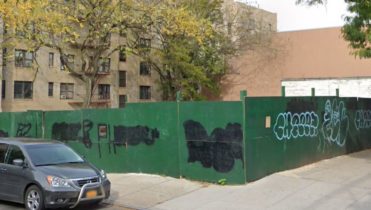
Green fences around stalled construction sites like these will be replaced with chain link fences under a new law. Image Credit: Google Maps.
The law will affect construction sites that have been stalled for over two years. On June 28, 2021, Local Law 74 was enacted by the NYC Council. The law which originated as Intro 1128 was introduced on September 26, 2018 by Council Member Robert Holden. The new law will amend the New York City Building Code by requiring the green fences that are in place at construction sites that have discontinued or stalled work for over two years be replaced with chain link fences and should work resume the chain link fences would again have to be replaced by the green wooden fences.Local Law History
Local Law 74 was originally conceived because wooden fences at stalled construction sites are often found in various conditions of disrepair and have been subject to various kinds of vandalism. A 2011 report by then Manhattan Borough President Scott Stringer found that of 129 stalled construction sites in Manhattan, 37 percent had litter issues and 60 percent had various vandalism issues or had fallen into disrepair. Council Member Holden believes the new law will provide a safer guarding that is less prone to weather conditions and deterioration. As the new fencing is made from chain it will also be less prone to vandalism whereas many of the green wooden fences can be found heavily vandalized. Council Member Holden also believes the law will help to address illicit drug activity, potential squatting, and vermin and pest issues that are common in these stalled buildings.
Law Enforcement
Failure to replace wooden fences with chain link fences after two continuous years of stalled construction could lead to being fined $25,000 by the Department of Buildings, the revocation of certain licensing or certificates, and/or an order to repair damage caused. These punishments will not occur without a hearing, the charged individual will be given five calendar days prior written notice of a hearing.
Council Committee Hearing
Prior to Local Law 74 being enacted, a hearing was held on January 29, 2019, by the City Council Committee on Housing and Buildings. Department of Buildings Assistant Commissioner Patrick Wehle voiced support for the bill but only under the understanding that the responsibility should be on the property owner to install the chain link fences. Council Member Chin had questions for the Department of Buildings regarding the scale of construction sites and the community breakdown affected by this bill. Assistant Commissioner Wehle responded by stating there was a certain amount of tracking through the 2009 Stalled Sites Program, but there was no tracking on stalled sites post 2013 when the Stalled Sites Program ended.
Pilar de Jesus, President of the East Harlem Preservation, testified and brought up issues of how these vacant properties could be used as low-income housing to better fight the ongoing housing crisis. Other concerned citizens testified that the chain link fences are easier to climb and thus people could get in easier. Council Member Holden addressed this by stating that chain link fences with smaller holes can be acquired to give less of a foot hold and making it more difficult to climb. Council Member Holden also brought up that the bill would help to address squatting, illicit drug activity, rodents and vermin, graffiti, safety, and what are referred to as derelict zombie homes.
On May 27, 2021, the bill was passed by the Committee Hearing on Housing and Buildings and then later that same day it was passed by the full City Council. Both votes were unanimous.
Enactment
The law will take effect 180 days from its enactment date. It is also estimated to have no impact on revenues or expenditures in the fiscal year 2023 where impact would be anticipated, this is due to the implementations using existing resources. It should be noted that this law will only affect construction sites where work has been discontinued or stalled for two continuous years after the effective date of this bill.
By: Patrick McNeill (Patrick is the CityLaw intern and a New York Law School student, Class of 2022.)

